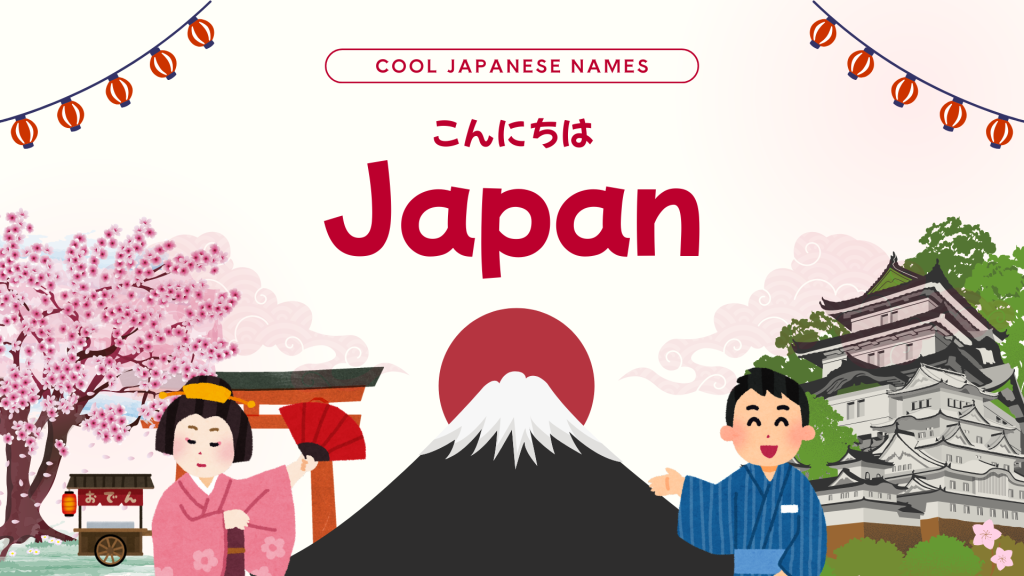
When people search for cool Japanese names, they are often looking for more than just words they are seeking meaning, culture, and an aura of elegance that goes beyond the surface. Japanese names hold deep connections to history, tradition, and even the natural world. Each name can represent power, resilience, beauty, or peace. In this article, we’ll explore 20 cool Japanese names that radiate both strength and grace, giving you inspiration whether you are naming a character, choosing a baby name, or simply interested in Japanese culture.
Contents
- 1 Why Cool Japanese Names Matter
- 1.1 20 Cool Japanese Names and Their Meanings
- 1.2 1. Haruto (陽翔)
- 1.3 2. Yumi (弓)
- 1.4 3. Ren (蓮)
- 1.5 4. Takumi (匠)
- 1.6 5. Sakura (桜)
- 1.7 6. Daichi (大地)
- 1.8 7. Aiko (愛子)
- 1.9 8. Riku (陸)
- 1.10 9. Naomi (直美)
- 1.11 10. Kaito (海翔)
- 1.12 11. Akira (明)
- 1.13 12. Hana (花)
- 1.14 13. Taro (太郎)
- 1.15 14. Mei (芽衣)
- 1.16 15. Shiro (四郎)
- 1.17 16. Ayaka (彩花)
- 1.18 17. Ryo (涼)
- 1.19 18. Hikari (光)
- 1.20 19. Kenji (健二)
- 1.21 20. Sora (空)
- 1.22 Cool Japanese Names in Pop Culture
- 2 The Global Rise of Cool Japanese Names
Why Cool Japanese Names Matter
Names are not just labels; they shape identity and perception. In Japanese culture, a name is often chosen for the meaning carried by its kanji characters. That’s why Japanese names stand out they are carefully crafted to reflect personality traits, aspirations, or symbolic qualities. Whether inspired by nature, warriors, or positive virtues, these names bring together power and elegance.
For many modern parents and creators, Japanese names offer a perfect balance between uniqueness and timelessness. Writers, for example, use them for characters to instantly convey strength, mystery, or beauty. Parents lean toward these names to bless their children with a sense of resilience and purpose.
20 Cool Japanese Names and Their Meanings
Here are twenty thoughtfully chosen cool Japanese names, each reflecting strength and grace:
1. Haruto (陽翔)
A popular boy’s name means “sun” and “soar.” It conveys brightness and ambition.
2. Yumi (弓)
Meaning “bow,” Yumi symbolizes both elegance and warrior strength.
3. Ren (蓮)
Meaning “lotus,” this name reflects purity, resilience, and spiritual strength.
4. Takumi (匠)
Translated as “master” or “artisan,” this name reflects skill and dedication.
5. Sakura (桜)
Meaning “cherry blossom,” Sakura embodies beauty, renewal, and fleeting strength.
6. Daichi (大地)
Meaning “great land,” this name suggests stability and grounded strength.
7. Aiko (愛子)
“Child of love,” Aiko carries both tenderness and noble spirit.
8. Riku (陸)
Meaning “land” or “shore,” Riku conveys stability and firm grounding.
9. Naomi (直美)
Meaning “straight” and “beauty,” Naomi reflects honesty and grace.
10. Kaito (海翔)
Meaning “ocean” and “soar,” Kaito symbolizes freedom and vast strength.
11. Akira (明)
Meaning “bright” or “clear,” Akira signifies wisdom and clarity.
12. Hana (花)
Simply “flower,” Hana is elegant, graceful, and timeless.
13. Taro (太郎)
Traditionally meaning “eldest son,” Taro represents strength and leadership.
14. Mei (芽衣)
Meaning “bud” and “garment,” Mei suggests new beginnings and grace.
15. Shiro (四郎)
Meaning “fourth son,” Shiro also conveys purity and simplicity.
16. Ayaka (彩花)
Meaning “colorful flower,” Ayaka embodies vibrant beauty and charm.
17. Ryo (涼)
Meaning “refreshing” or “cool,” Ryo is simple yet powerful.
18. Hikari (光)
Meaning “light,” Hikari symbolizes hope, guidance, and inspiration.
19. Kenji (健二)
Meaning “healthy” and “second son,” Kenji reflects resilience and strength.
20. Sora (空)
Meaning “sky,” Sora embodies freedom, openness, and limitless possibility.
The Cultural Significance Behind Cool Japanese Names
Each of these cool Japanese names connects to cultural values. Strength is not only physical but also emotional, intellectual, and spiritual. Grace is not just elegance but also kindness, humility, and balance. Together, they create names that are rich with character and meaning.
For example, Sakura is tied to the iconic cherry blossoms of Japan, symbolizing beauty and impermanence. Meanwhile, Takumi reflects the Japanese tradition of craftsmanship and mastery. These layers of symbolism make cool Japanese names more than just sounds; they are powerful cultural statements.
Why People Love Choosing Cool Japanese Names
There are several reasons why cool Japanese names are increasingly popular worldwide:
- Uniqueness: They stand out while maintaining elegance.
- Meaningful roots: Each name carries kanji-based symbolism.
- Aesthetic sound: Japanese names often sound soft yet strong.
- Cultural connection: They link directly to Japanese heritage.
Parents and creators alike often feel drawn to these names because they bridge the gap between modern identity and traditional wisdom.
Cool Japanese Names in Pop Culture

Anime, movies, and literature have introduced many cool Japanese names to international audiences. Names like Naruto, Kenshin, or Totoro’s Mei carry lasting impressions. These names not only identify characters but also embody their essence, courage, innocence, or wisdom.
Even global brands recognize the appeal of names with cultural roots. Just as marketers brainstorm company names to reflect strength, trust, or innovation, writers and parents seek cool Japanese names to highlight values such as bravery, beauty, and resilience. The careful selection process mirrors how impactful naming can be in shaping perceptions.
Tips for Choosing Cool Japanese Names
When selecting from the list of cool Japanese names, consider the following:
- Meaning over sound: Focus on the kanji meanings first.
- Cultural fit: Some names are traditionally masculine, feminine, or unisex.
- Personal resonance: Pick a name that feels connected to you or your character.
- Balance: Look for names that harmonize strength with grace.
These guidelines help ensure that the name chosen carries lasting significance.
The Global Rise of Cool Japanese Names
As Japanese culture spreads worldwide through anime, technology, and cuisine, interest in cool Japanese names has grown. Parents in countries outside Japan now consider these names for their children, appreciating their deep meaning and beautiful sound. Creators of novels and games use them to add authenticity and power to their characters.
The rise of cool Japanese names shows how cultural appreciation can travel across borders and enrich global identity.
Conclusion
Cool Japanese names are more than just identifiers; they are powerful expressions of strength, grace, and cultural depth. From Sakura’s delicate blossoms to Kenji’s enduring resilience, each name offers a story, a value, and a symbol.
For parents, choosing cool Japanese names for their children means blessing them with meaning and heritage. For writers and creators, these names help craft unforgettable characters. And for anyone drawn to the beauty of language, cool Japanese names embody the perfect blend of strength and elegance.
In a world where names shape identity and perception, cool Japanese names remain timeless treasures that radiate both resilience and beauty.
